Biblical Commentary
 Capital Crime. Capital Punishment?
Capital Crime. Capital Punishment?Tuesday, July 5, 2011 by Aryeh Tepper | Jewish Ideas Daily » Daily Features
Since its founding, the only person ever to be executed by the state of Israel has been the notorious Nazi, Adolf Eichmann. But the brutal murders of Udi and Ruth Fogel and three of their young children this past March has the IDF weighing the possibility of seeking the death penalty for the Fogels' murderers.
 Israelites in the Anglo-Saxon Sea
Israelites in the Anglo-Saxon SeaFriday, June 17, 2011 by David Curzon | Jewish Ideas Daily » Daily Features
Since it was first composed, there have been dozens—if not hundreds—of renderings of the Hebrew Bible. The process of translation and creative elaboration began during the first millennium B.C.E.
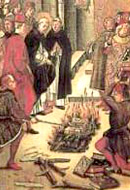 Sympathy for the Devil
Sympathy for the DevilMonday, May 23, 2011 by Allan Nadler | Jewish Ideas Daily » Daily Features
Occupying a place of particular infamy in Jewish collective memory is an 18th-century serial apostate, sexual deviant, messianic pretender, and chameleonic charlatan. His name was Jacob Frank.
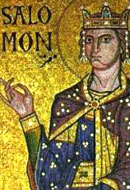 Seeking Solomon
Seeking SolomonTuesday, March 29, 2011 by Eve Levavi Feinstein | Jewish Ideas Daily » Daily Features
For traditionalists, the biography of King Solomon is enshrined in the Bible, in the narrative accounts in the books of Kings and Chronicles. The son of King David, who spent his career battling Israel's enemies, Solomon is depicted as ushering in an era of peace and prosperity. Yet the Bible also relates that Solomon took numerous foreign wives and concubines—one thousand in total—who led him to worship foreign gods and build shrines for their service.
 Halakhah for Americans
Halakhah for AmericansFriday, March 18, 2011 by Elli Fischer | Jewish Ideas Daily » Daily Features
Asked in a 1975 New York Times interview how he had acquired his standing as America's most trusted authority in Jewish religious law (halakhah), Rabbi Moshe Feinstein (1895-1986) replied: ''If people see that one answer is good and another answer is good, gradually you will be accepted."
 The Virtuoso of Judaism
The Virtuoso of JudaismThursday, March 3, 2011 by Yehudah Mirsky | Jewish Ideas Daily » Daily Features
Religious virtuosity comes in many forms. One of them is the ability to reconcile seeming irreconcilables, like faith and freedom, piety and intellect, revelation and science. The dream of synthesis has lured many in the past two centuries. One who seemed to live it was Joseph B. Soloveitchik.
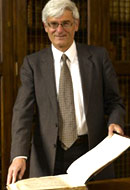 Talmud: The Back Story
Talmud: The Back StoryThursday, January 27, 2011 by Yehudah Mirsky | Jewish Ideas Daily » Daily Features
There is no getting away from the Babylonian Talmud. Love it, hate it, or both, this monumental work has been central to Jewish life for a millennium and more, managing time after time to find new readers and to summon new forms of reading.
 The Warrior Rabbi
The Warrior RabbiFriday, November 5, 2010 by Aryeh Tepper | Jewish Ideas Daily » Daily Features
Praise of military virtue, prominent in the Bible, is almost non-existent in the Talmud, which, in the aftermath of the destruction of the Temple and the exile of the Jews by the Romans, either ignores wartime feats or re-interprets them as allegories of intellectual or spiritual prowess. The Talmud's relative silence on the subject would prove enduring. Until the second half of the 20th century, with few exceptions, military virtue was consistently depreciated in traditional Jewish thought.
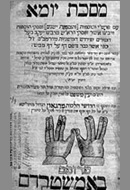 The Persian Talmud
The Persian TalmudTuesday, November 2, 2010 by Yehudah Mirsky | Jewish Ideas Daily » Daily Features
A recent gathering of scholars who have been intensely researching the buried treasures of "Irano-Judaica," together with the release of a volume titled The Talmud in its Iranian Context, underscores one of the most exciting developments in Jewish studies: the effort to put the "Babylonia" back into the Babylonian Talmud.
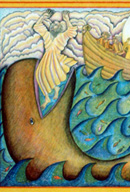 Jonah and Yom Kippur
Jonah and Yom KippurWednesday, September 15, 2010 by Meir Soloveichik | Jewish Ideas Daily » Daily Features
Read in its entirety in the synagogue in the afternoon of Yom Kippur, Jonah is the only multi-chapter book of the Bible to be so honored. Indeed, one commentator, observing that the brief Torah reading that precedes Jonah has little to do with the day, but merely continues where the morning reading left off, has suggested that this may be precisely in order to emphasize that, in a departure from the usual priorities, the haftarah, or prophetic portion, is in fact the critical text for the occasion. But what makes it so significant, and what lesson does it really teach about Yom Kippur?
Editors' Picks
Amalek and Moral Ambiguity Gil Student, Torah Musings. While halakhically persuasive, a new study of the moral contradiction inherent in the commandment to wipe out the Amalekites is not emotionally sufficient.
Why Not Covet? Elchanan Samet, Virtual Beit Midrash. Reasons for the tenth commandment (found in this week's Torah portion): practical, psychological, moral, spiritual.
Indices, Plural Michtavim. The New York Times' recent report on a new index to the Talmud neglected to point out that this work stands in the shadow of a 16th-century index—one that, perhaps, changed the course of Jewish history.
People of the Sea Natan Slifkin, Rationalist Judaism. An accurate talmudic account of dolphins, understood by Rashi to refer to mermaids, tests the purported infallibility of early commentators.
Physician, Explain Thyself Michael L. Satlow, Talmud Blog. How can we account for the Babylonian Talmud's medical advice, which in many cases seems to have been transmitted retrojectively?
Academe Award Elli Fischer, Shai Secunda, Jewish Review of Books. Set in the Hebrew University's Talmud department, Footnote is a film of serious philosophical inquiry, cloaked in winking academic gossip for those in the know.
Evil Urge Amit Gevaryahu, Talmud Blog. A new work tackles one of the most entrenched myths in the academic study of Jewish sources: namely, that Judaism has historically been a sex-positive religion.
Myrtle, Date Palm, Willow, Citron Arthur Schaffer, Tradition. What do the "four species" of Sukkot signify? A botanist finds an agricultural interpretation that would have been readily available to an ancient Israelite farmer. (PDF, 1982)
Hope Springs Talmudic Shai Secunda, Jewish Week. Unfolding beyond the crush of defeat, the Talmud's vigorous spirit of inquiry represents a great, resilient optimism.
Plato and the Talmud Alan Avery-Peck, Review of Biblical Literature. Philosophically, "Athens" and "Jerusalem" represent wholly incompatible viewpoints on the truth. Not so, argues a new book. (PDF)

